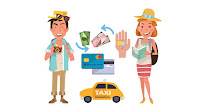What is the cheapest method of payment while traveling? Local currency or by credit card?
A reader wrote that he returned from a trip to Switzerland where he was
offered to pay in Canadian dollars from the POS terminals. But impossible to compare the rate of this service with that of the credit card.
Most credit card issuers will charge you a fee for this service salty, usually 4% to 18% of the transaction, depending on the card and the merchant.
The worst places are also duty-free shops at airports, told me a traveler friend.
Some credit cards, specific travel, or type "privilege" or even some ordinary cards do not charge a conversion fee. But they are rare and usually involve higher or lower annual fee. For most cards, the conversion costs typically exceed 2% per transaction abroad.
For example, if you are shopping for $ 5,000 and that your expenses have averaged 2.5%, adding $ 125 to your bill. More exchange rates and conversion fees in Canadian dollars ...
How to get around all these costs? With local currencies? Not so simple, because even if ATMs are everywhere (I have unearthed in the Sahara), you will need to pay network fees or usage for each transaction, which are most of the time prohibitive: costs desk vary from $ 3 to $ 15, plus those network $ 3 to $ 5, plus the exchange rate!
A large withdrawal
A traveler from trick: if you absolutely must make a withdrawal from an ATM abroad, get a large sum. As long as you pay more than $ 20 miscellaneous expenses ... In addition, interest is charged from the date of withdrawal. Unearth a safe internet station on the day of the withdrawal and repay it from your bank account. Better make an excess deposit on your credit card before leaving the amount you plan to retire abroad. The withdrawal made there will be no interest.
Shop your currency
If you insist on paying cash, shop your currency before leaving. It's been thirty years since I travel and am always flabbergasted to see the difference of costs between the financial institutions and exchange offices. Shun those airports, which are prohibitive, as are banks and credit unions. Prefer exchange offices downtown areas. And I have seen huge differences between even neighboring offices.
That said, is it prudent to hide bundles of money in his socks? The few dollars lost in conversion charges you might allow to travel with peace of mind.
You can choose from against traveler's checks, the rates are often more advantageous for the plastic money. But in Europe, traders hate. I saw who refused to accept them, to give change or have imposed outright bogus administrative costs.
OUR ADVICE
Do your banking transactions abroad in the business centers of the major hotels, safer than internet cafes.
Avoid small cash withdrawals abroad and systematically refuse automatic conversions in Canadian dollars.
